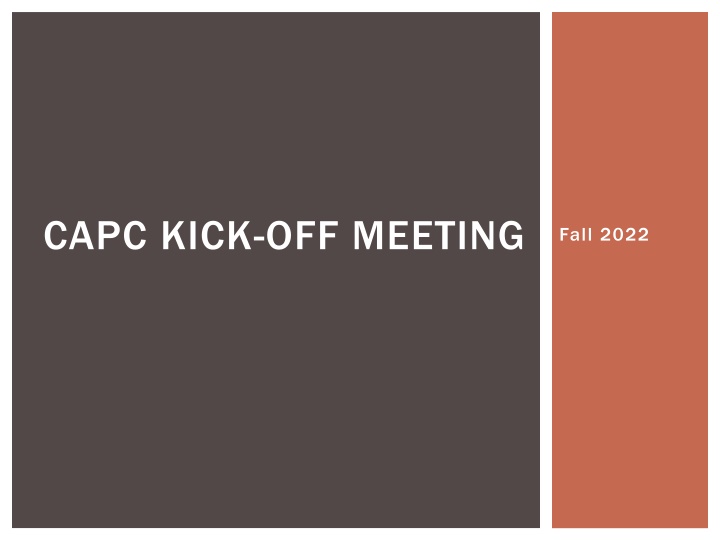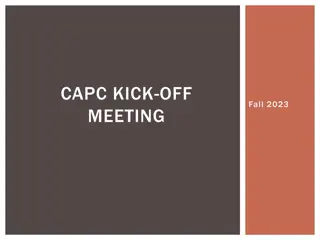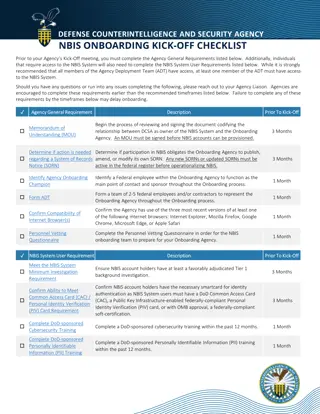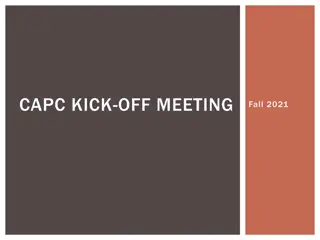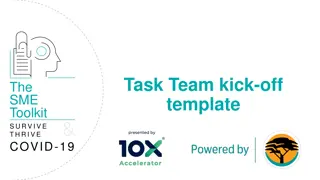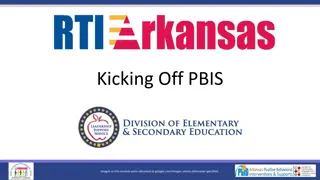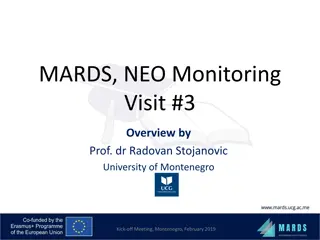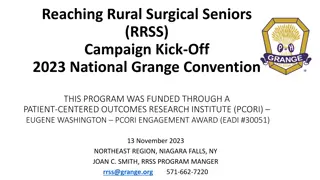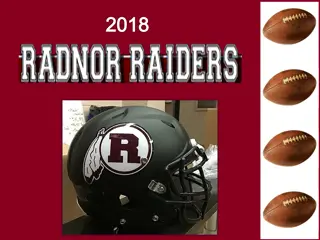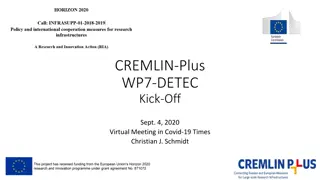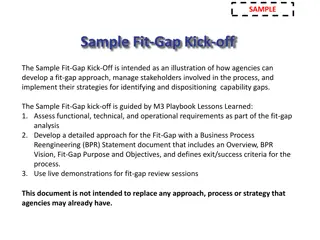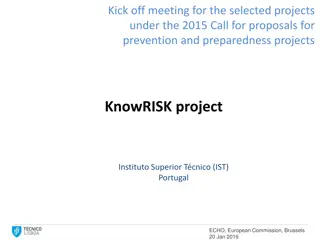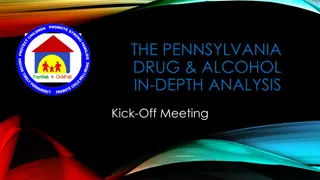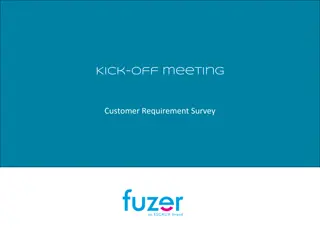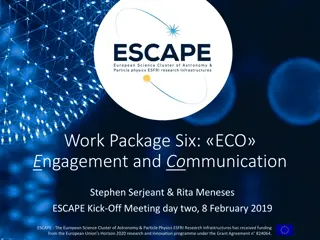CAPC KICK-OFF MEETING
This meeting marks the official start of the Fall 2022 activities for the CAPC organization. It will set the tone and direction for the upcoming projects and collaborations, aiming to bring together all team members in a productive and focused manner. Discussions on goals, strategies, and timelines are expected to take place, fostering a sense of unity and purpose among participants.
Download Presentation

Please find below an Image/Link to download the presentation.
The content on the website is provided AS IS for your information and personal use only. It may not be sold, licensed, or shared on other websites without obtaining consent from the author.If you encounter any issues during the download, it is possible that the publisher has removed the file from their server.
You are allowed to download the files provided on this website for personal or commercial use, subject to the condition that they are used lawfully. All files are the property of their respective owners.
The content on the website is provided AS IS for your information and personal use only. It may not be sold, licensed, or shared on other websites without obtaining consent from the author.
E N D
Presentation Transcript
CAPC KICK-OFF MEETING Fall 2022
WHAT IS CAPC? CAPC is the Curriculum and Academic Policies Council CAPC is a faculty legislative body, the only such body with authority to recommend changes to (or creation of) the curriculum and/or academic policies CAPC is a recommending body; the Provost has sole authority other the curriculum and academic policies
WHY ARE WE HERE? because CAPC is the curricular body mandated by the CBA (Article 31 section E): There shall be a curriculum committee at each University, which shall be selected as determined by the FACULTY, but which may include at least one (1) administrator if designated by the President.
WHY ARE WE HERE? CAPC is governed by a set of bylaws that lay out the committee structure, duties, and processes that comprise the foundation of CAPC s work APSCUF runs elections for CAPC, which involve both at-large and department-specific members. Members are elected to do the following: participate in CAPC s decision-making processes around curriculum and academic policies, through the committee structure report back to their constituencies (department, college, etc.) about CAPC processes and actions department-specific members also provide support and guidance for colleagues developing curriculum proposals for submission to CAPC, e.g., about learning outcomes, CIM, etc.
HOW CAPC WORKS Participation in decision-making processes happens through: work on committees and subcommittees monthly CAPC General Assembly meeting where decisions are made on the proposals sent up by the committees
HOW CAPC WORKS Several CAPC Committees have subcommittees: General Education Distributives Diverse Communities Ethics Interdisciplinary Speaking Emphasis Writing Emphasis
HOW CAPC WORKS Several CAPC Committees have subcommittees: Academic Review Course Review and Revalidation Low Enrollment Advisory New Programs Advisory Program Review Undergraduate Programs Culture Cluster
2022-23 CAPC EXECUTIVE COMMITTEE Chair Chair: Susan Johnston, Anthropology & Sociology Vice Chair Vice Chair: Rodney Mader, English Secretary Secretary: Francis Atuahene, Undergraduate Studies & Student Support Services Undergraduate Programs Undergraduate Programs: Josh Auld, Associate Provost for Academic Affairs Undergraduate Policies Undergraduate Policies: Elizabeth Pfaffle, Applied Music Graduate Programs & Policies Graduate Programs & Policies: Lisa Calvano, Dean of the Graduate School General Education General Education: Karen Mitchell, Psychology Academic Review Academic Review: Jade Burris, Early & Middle Grades Education CAPC Support CAPC Support: Patrick Richard, Academic Affairs
HOW CAPC WORKS You should know your assigned committee(s) by now. If not, they can be found at the CAPC website Committees should meet on a regular schedule Your service on CAPC includes attendance at both Assembly meetings Assembly meetings and committee meetings committee meetings If you cannot attend, your proxy should attend on your behalf applies to both Assembly applies to both Assembly and committee meetings meetings The bylaws require all CAPC members to have a proxy identified in advance of meetings committee
HOW CAPC WORKS Article 4.A.1.c. Each CAPC member will submit to the CAPC Secretary written notification of that member s proxy. In the case of members elected by constituency, the proxy must be selected from the same constituency. Proxies should be identified no later than the first scheduled Assembly in the fall. Should the proxy require an alternate, the proxy or member should notify the Recording Secretary in writing prior to the Assembly in which the alternate is to serve.
HOW CAPC WORKS Your service on CAPC also includes the following: preparing for committee and sub-committee meetings by reading in advance and reflecting on all documents on the agenda preparing for CAPC Assembly by reviewing in advance those items on the agenda that did not come from your committee ensuring that you are fully acquainted with the current requirements for course and program proposals, including the relevant policies (syllabi, course evaluations, etc.)
HOW CAPC WORKS Part of your duty as a CAPC member is to represent your constituency, and this means reporting back to them about CAPC Assembly and its procedures, debates, and recommendations. This includes CAPC decisions about courses, programs, or policies that may have impact on your department (or your other constituencies), whether or not they originated in your department or college You should also let your constituents know when an item of theirs appears on the Assembly agenda and remind them that they are invited to attend the relevant assembly meeting they are invited to attend the relevant assembly meeting to respond to questions that might arise
HOW CAPC WORKS NOTE: When a committee has sent an item forward for the Assembly agenda, it is with that committee s approval (unless explicitly stated otherwise). Similarly, when a department chair, dean, or CAPC officer signs off on a proposal in CIM, it indicates approval (not simply acknowledgment) That said, deans may assume they are leaving curricular decisions to the departments and to CAPC, and are only approving the availability of resources and other non-curricular issues In point of fact, a decision at each step in the review process is to recommend (or not), since final approval rests with the Provost
HOW CAPC WORKS Motions passed by CAPC are submitted to the Provost for approval. She makes the ultimate decisions regarding curriculum and academic policy. There is a procedure for dialogue in the event that the Provost does not approve CAPC recommendations. This is rare, however. The Provost s approvals are circulated by Patrick Richard and are available on the CAPC website.
CAPC WEBSITE https://www.wcupa.edu/viceProvost/capc/
REMEMBER In summary: CAPC is a contractually mandated representative body that gives faculty significant control over the curriculum. At WCU, we have it a lot better than many other places, including some in PASSHE As CAPC representatives, we have an obligation to responsibly carry out our mandate on behalf of the faculty and departments we represent
CIM: COURSE INVENTORY MANAGEMENT https://www.wcupa.edu/viceProvost/capc/
HOW CIM WORKS Note: Email notifications (approval requests & notifications) come from Patrick Richard Note: Email notifications (approval requests & notifications) come from Patrick Richard
CIM OPEN LABS Tuesday, Sept. 6, 2-4, Philips Lower-Level Conference Room Wednesday, Sept. 14, 11-1, via Zoom (email was sent out by Patrick with link)
RECENT UPDATES & EFFORTS FOR THIS YEAR
PROGRESS TOWARD ACADEMIC PROGRAM COMPLIANCE SPRING 2022 PASSHE Minor Policy Requirements PASSHE Minor Policy Requirements Students must complete a minimum of six credits of advanced standing courses as part of the minor Academic Minors must not include concentration, tracks, emphasis, specializations (reserved for academic majors under PASSHE policy) WCU Interim Policy Framework, approved May 2022 Advanced standing = any 300-400 level course, and 200 level courses with at least 2 prerequisites (identified by depts) Prerequisites for specified required courses must be listed in the minor and counted toward total credits Removal of terminology like concentrations , tracks , etc. from minors; replacement with focus areas or electives
GENERAL EDUCATION PROGRAM & ADDITIONAL BACCALAUREATE REQUIREMENTS (MAY 2022) General Education Program General Education Program ACADEMIC FOUNDATIONS: First Year Experience requirement 4 English Composition requirement 6-7 Mathematics requirement 3-4 Interdisciplinary requirement (I) 3 Diverse Communities requirement (J) 3 Ethics requirement (ET) 3 DISTRIBUTED DISCIPLINARY FOUNDATIONS: Science requirement 6-8 Behavioral and Social Science requirement 6 Humanities requirement 6 Arts requirement 3 TOTAL CREDITS 43-47
GENERAL EDUCATION PROGRAM & ADDITIONAL BACCALAUREATE REQUIREMENTS (MAY 2022) Additional Baccalaureate Requirements Additional Baccalaureate Requirements UNIVERSITY REQUIREMENTS Writing Emphasis requirement for all Baccalaureate Degrees (W) 9 Speaking Emphasis requirement for all Baccalaureate Degrees (SE) 9 DEGREE REQUIREMENTS Language and Culture requirements for certain Baccalaureate Degrees 0-15 Capstone Requirement 1-15
EFFORTS THIS YEAR Academic Programs & Policies Academic Programs & Policies Continue development and review of comprehensive Undergraduate Academic Programs Policy Graduate Academic Programs Policy Revisit/complete work on other academic policies in need of updating Ensure undergraduate major and minor programs comply with existing PASSHE policy and local definitions Minor programs: 6 cr. advanced standing; no hidden pre- reqs; no tracks; concentrations etc.; minimum 18 cr. Major programs: BA no more than 42 cr. required and cognate courses; BS no more than 60 cr.
EFFORTS THIS YEAR General Education (GE) and General Requirements General Education (GE) and General Requirements Re-envisioning the Interdisciplinary requirement Temporary suspension of new Interdisciplinary (I) course proposals while this is in process Writing Emphasis course revalidation AY22-23 Call for GE Capstone Assignments AY22-23 Campus-wide roll-out of Google Sites as the Gen Ed e- Portfolio platform; identification of artifacts for the e- Portfolio across Gen Ed courses Ongoing: Gen Ed courses that come through the proposal review process, regardless of rationale, will be reviewed under the current GE goal and SLO structure
EFFORTS THIS YEAR Diverse Communities Task Force 2021-2022 Report received this month and will be reviewed by Exec for appropriate follow-up via CAPC process DE Training Task Force, Summer 2022 Report anticipated soon and will be reviewed by Exec for appropriate follow-up via CAPC process Bylaws We have entered into conversation with APSCUF about renewing the bylaws; current version is 10 years old and needs updating
